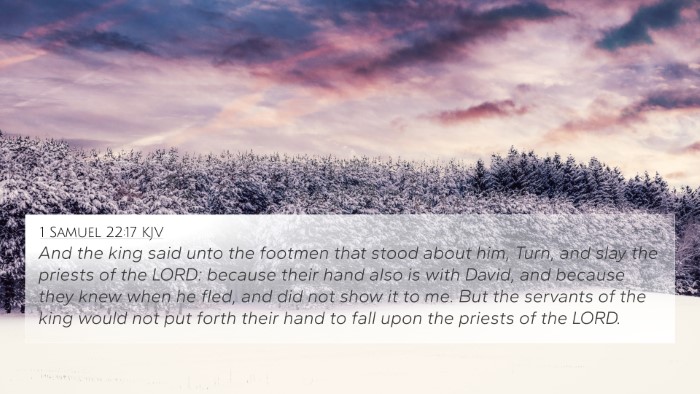Psalms 55:20 - Insights and Meaning
Bible Verse: "He hath put forth his hands against such as be at peace with him: he hath broken his covenant."
Overview of Psalms 55:20
This verse reflects the themes of betrayal and conflict within relationships, particularly focusing on those who were once in a state of peace but have now become adversaries. David, the psalmist, vividly expresses the deep hurt caused by treachery from those he trusted.
Commentary Insights
By examining the thoughts from several public domain commentaries, we can glean a deeper understanding of this passage.
Matthew Henry's Commentary
Matthew Henry interprets this verse as a somber reflection on betrayal. He notes that the psalmist laments how close relations can suddenly turn hostile. Henry emphasizes that when those who were once allies strike against the ones they were close to, it not only causes emotional pain but also disrupts the covenant relationship that was established.
Albert Barnes' Commentary
Albert Barnes points out that the act of breaking covenant signifies a severe transgression. Barnes suggests that the hands being "put forth" symbolizes not just an act of aggression but a complete disregard for loyalty. This hand imagery is powerful, indicating how deep-rooted the betrayal is when someone actively opposes a friend.
Adam Clarke's Commentary
Adam Clarke brings in contextual insights by explaining that this verse can relate to the political intrigues of David’s reign. Clarke mentions that this may remind readers of the treachery faced not only by David but also as a general human experience when alliances fail. He points to the psychological impact of betrayal, where the betrayal of a covenant produces feelings of confusion and injustice.
Connections Between Bible Verses
This verse can be cross-referenced with several other passages that illuminate themes of betrayal, conflict, and the brokenness of human relationships:
- Psalm 41:9: "Yea, mine own familiar friend, in whom I trusted, which did eat of my bread, hath lifted up his heel against me."
- Proverbs 25:19: "Confidence in an unfaithful man in time of trouble is like a broken tooth, and a foot out of joint."
- Jeremiah 12:6: "For even thy brethren, and the house of thy father, even they have dealt deceitfully with thee; yea, they have called a multitude after thee: believe them not, though they speak fair words unto thee."
- Matthew 26:14-15: "Then one of the twelve, called Judas Iscariot, went unto the chief priests, and said unto them, What will ye give me, and I will deliver him unto you?"
- John 13:18: "I speak not of you all: I know whom I have chosen: but that the scripture may be fulfilled, He that eateth bread with me hath lifted up his heel against me."
- Luke 22:48: "But Jesus said unto him, Judas, betrayest thou the Son of man with a kiss?"
- Galatians 6:1: "Brethren, if a man be overtaken in a fault, ye which are spiritual, restore such an one in the spirit of meekness; considering thyself, lest thou also be tempted."
Understanding the Thematic Connections
Thematically, Psalms 55:20 aligns with concepts of loyalty and the serious consequences of betrayal. It echoes through the narratives of both the Old and New Testaments, as seen in David's lamentations and in the actions of Judas. Understanding these connections through cross-referencing can provide deeper insights into not only the emotional impact of betrayal but also the broader implications on relationships and faith.
Tools for Bible Cross-Referencing
For deeper study, there are various tools and methods available that aid in finding cross-references in the Bible:
- Bible Concordance: A comprehensive tool to find various references related to specific words and themes.
- Bible Cross-Reference Guide: Helps link similar verses across different books of the Bible.
- Cross-Reference Bible Study: A method to study Biblical themes through the lens of interconnected scriptures.
- Bible Reference Resources: Collection of materials that offer insights and explanations of biblical texts.
- Bible Chain References: A linking system to follow a topic or theme through various parts of scripture.
Conclusion
Psalms 55:20 is a poignant reminder of the dangers of betrayal, particularly by those we consider friends. Understanding this verse within its broader scriptural context can enhance our comprehension of both human relationships and the nature of divine covenant. By exploring the cross-references, readers can gain a holistic view of how biblical authors treat themes of loyalty and betrayal throughout scripture.


















